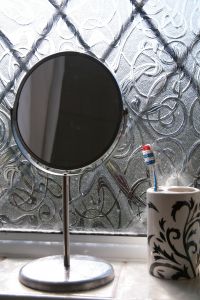Yes, I used *gasp* an adverb. Sloppy, maybe, but this is the exact phrase I heard this morning. Although in a completely different context, it captured my attention. Of course, the writer in me instantly starts playing with the word choice and connotations: through a mirror, darkly; in a mirror, darkly; "can someone look through a mirror?" and "*warning-cliche ahead*"

The point, however, is that some of what we see in our reflection is not always what others see--it is a dimly lit place of truth, clouded by messy human emotions. A reversal of the power we normally attribute to mirrors. Usually, we are to see in them the honesty we share with no one else, but is it possible for this image to distort in undetected increments the way time alters loved ones we see everyday?
The abused sees shades of unworthiness. The executive finds entitlement in the sharp lines of his brow. The beautiful see only the flaws. Is it possible this is the one thing that creates character depth above all things?
One thread common to all my stories is the longing to return to self. In almost all, the main character has slipped away on a tide of life and circumstance so far from what they believed they would become or what they're capable of, they barely recognize their own image. What greater sadness in a character's backstory could there be than that of a stranger they've become? And, the fact that we're all guilty of shades of untruths about ourselves to some extent, makes the story experience real. Candid. Raw.
Hold your protagonist to a mirror this week as you craft his story. What do you see? How is that different than what your character sees?

 The point, however, is that some of what we see in our reflection is not always what others see--it is a dimly lit place of truth, clouded by messy human emotions. A reversal of the power we normally attribute to mirrors. Usually, we are to see in them the honesty we share with no one else, but is it possible for this image to distort in undetected increments the way time alters loved ones we see everyday?
The point, however, is that some of what we see in our reflection is not always what others see--it is a dimly lit place of truth, clouded by messy human emotions. A reversal of the power we normally attribute to mirrors. Usually, we are to see in them the honesty we share with no one else, but is it possible for this image to distort in undetected increments the way time alters loved ones we see everyday?
Mirrors can be such tremendous tools for revealing character in writing (when careful to avoid those goofy cliches: "She admired her perfectly toned shoulders in the mirror's reflection, noting how her gorgeous, long, auburn hair swept against her bronzed skin..." 🙂
In one of the books I'm revising, I play with the heroine's mirror image, too. It's interesting to me to reveal her reasons (in her POV) for having this distorted self image. I, of course, as the writer, don't see her nearly as negatively, and I'm hoping the reader will be able to distinguish between the heroine's unreliable narration and the "truth" of the story.
L.A. wow, philosophy! And good at that. And I do see how life circumstances have swept your characters on a current perhaps not of their own choosing. God, you are good!
I absolutely love unreliable narrators. It is, in the end, what we all are, right?